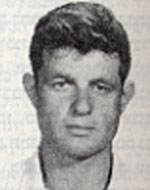Linder, Benjamin (Benny)
Binyamin, son of Mina and Baruch, was born on the 10th of Tevet 5703 (December 10, 1942) in Rehovot, Benjamin was drafted into the IDF in late October 1960 and volunteered for the paratroop brigade. He completed basic training and parachuting training, and after a while completed as an outstanding apprentice in the Nahal Brigade, and as a member of the “Yuvalim” nucleus, who was to land on the ground in Yodfat, Benny did his service in Segev, in the Western Galilee. My son convinced him that he would pass to the unit’s command staff, and they met with a smile and with a dismissive wave of disdain. At the end of April 1963, Benny was discharged from the regular army and together with his friends he settled in Yodfat. He married his girlfriend Zvia, and the two were sent to school in Jerusalem. Here, for the first time, he knew the flower bulbs. In the flowers, Benny found his destination. He would dig in his hands, fearing that a machine would strike the delicate onions and at the end of the school year in Jerusalem brought Yodfat the branch of growing onions for flowers. He entered this area most of his head and was the first country to bring the industry to prosperity. A small surface of the land, the area of growth grew and Benny became a great expert in his profession. He was assisted by the Volcani Institute in Beit Dagan and later became a teacher. He was sent to the Netherlands and the countries of Europe, to contact the growers there, and Yodfat began to market and export flowers in Israel, since they were of the highest quality in the world. During the Six-Day War, Benny fought in the Golan Heights as part of his reserve service. At the end of the fighting, he devoted all his attention to collecting flowers from the plateau. He brought a whole bag and managed to develop rare types of flowers, no one knew about their existence in our region. The flower bulbs were absorbed in the various parts of the country, and Benny used to travel and visit his children in the various plots, in the south and center of the country. Livni had a rare approach of his own in negotiations with the institutions. He used to bring the delegates to the plots, to tour with them in the field and then bring them to his warm and pleasant home, and indeed he always succeeded in achieving his goals. Benny has the ability to do anything, with full readiness and to invest his whole life with persistence and consistency. His friends tell him that in the field of work he was a tremendous force and excelled in great power and in perfect performance – all in good spirits. His criticism was important to his employees, because they knew that behind her stood a great deal of knowledge. With his Arab neighbors he created close and warm relations with neighbors, and he also had control of the Arabic language, his kindness, and his smile. When the Yom Kippur War broke out, Benny left the synagogue and rushed to his unit on the Golan Heights. On Simchat Torah, his brother brought the news that on the day of the 16th of Tishrei 5734 (October 12, 1973), Benny and twelve of his comrades were killed in a battle over Khan Arnabeh. He was brought to eternal rest in the cemetery in Yodfat. He left behind a wife, two daughters and a son, parents, brother and sister. After his fall, he was promoted to sergeant.
